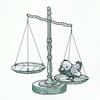Andrew Cohen appears in the following:
Case in Point: Jury Discrimination May Force Retrial of Man Imprisoned for 41 Years
Tuesday, May 15, 2018
41 years ago, an all-white jury convicted Johnny Lee Gates, an intellectually disabled black man, for the murder of a white woman in Georgia.
Despite Low I.Q. and Young Age, Corey Williams Received Death Penalty
Tuesday, April 17, 2018
Corey Williams was 16 years old when he was arrested for murder. Despite no physical evidence linking him to the crime, Williams was sentenced to death.
Doesn’t Anyone Want to Know Who Killed Louise Cicelsky?
Tuesday, February 13, 2018
New York prosecutors object to new DNA testing that might answer questions left unanswered at a murder trial.
When Capital Punishment is a Game of Chance
Tuesday, January 30, 2018
The latest edition of Case in Point from The Marshall Project tells the story of Renard Marcel Daniel.
Old Law Lets Social Media Giants Side With Prosecutors in Criminal Cases
Tuesday, January 16, 2018
Under a federal law from 1986, social media companies claim to be forbidden from providing the same information to defense attorneys that they are obligated to turn over to prosecutors.
Corporate Accountability? Why Big Businesses Favor the 'C' Plea
Tuesday, December 05, 2017
The weeks Case in Point is about plea deals — in particular “C” pleas — which tend to favor mostly corporations.
When Coercion Enters The Interrogation Room
Tuesday, November 14, 2017
A look at the complex and often blurry laws surrounding police conduct during interrogations.
The Last Jim Crow Law
Wednesday, September 27, 2017
Louisiana is one of two states where defendants can be convicted without unanimous juries, a tradition that stems from a history of white supremacy in the state.
Is There a Constitutional Right to Cash in on the Poor?
Tuesday, September 12, 2017
One Arkansas county takes on a private probation company.
Despite Wrongful Convictions, Securing Freedom Isn't So Easy
Thursday, August 10, 2017
This week's Case In Point examines the story of Victor Rosario, who spent 32 years in prison in Massachusetts and the standard for review that freed him.
Released From Prison Decades After a Retrial That Never Came
Tuesday, June 13, 2017
Jerry Hatfield was convicted in 1977 of killing a woman in Bay City, Texas. His conviction was reversed a few years later, but he was just set free this week.
Defendants Struggle to Find Justice in Tennessee
Tuesday, May 23, 2017
A look inside Tennessee's criminal justice system reveals the difficulty some defendants face when trying to secure due process and a fair trial.
Is It Murder if There’s No Homicide?
Tuesday, April 25, 2017
In 1999, Jessie McKim was convicted of murder. In 2013, a medical examiner determined the woman he supposedly killed actually died of a drug overdose — but McKim is still in prison.
When Justice Goes Wrong
Tuesday, April 11, 2017
Susan King was wrongly convicted of murder in Kentucky in 2006. She says she was framed by a detective, and spent over six years behind bars.
When the Right to Remain Silent is Called Into Question
Wednesday, March 22, 2017
There are countless cases in which lawyers and judges argue over whether defendants have, indeed, exercised their constitutional “right to remain silent.” This is one of them.
A Common Practice Among Local Police Draws Criticism from a Supreme Court Justice
Friday, March 10, 2017
Police can seize your stuff and keep it, even if you haven't been charged.


















